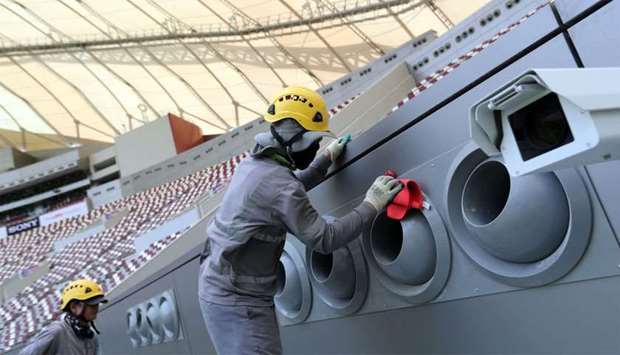FIFA on Wednesday sought to reject claims by Amnesty International that migrant workers building World Cup stadiums in Qatar had not been paid.
Football’s governing body said the human rights charity had been ‘misleading’ when it claimed the 78 Mercury MENA workers had been involved on projects relating to the 2022 tournament.
"We have no reason to believe the reported violations of workers’ rights are in fact linked to FIFA and the 2022 World Cup," said the FIFA spokesman. "We regret Amnesty chose to frame its statement in such a misleading manner."
But according to Amnesty, Mercury MENA did work on an infrastructure project which, although not directly a World Cup structure, was part of the showpiece city where the opening and final matches will be played in 2022.
There are currently 25,000 workers involved in the construction of eight stadiums for the FIFA event, including the one in Lusail City.
This compares with 1.8mn who are employed across the Gulf state in all types of construction work.
They include those building Lusail itself, a newly constructed city on the edge of Doha where the Mercury MENA workers were employed.
Ever since it won the right to host the World Cup in 2010 Qatar – and FIFA - have been under the international spotlight over the issue of workers’ rights, which the Gulf country is trying to address through a programme of reforms.
At the root of the row is the ‘kafala’ system which affects more than 20mn people across the Gulf region. Under this, without the necessary paperwork, employees are unable to leave the country.
This is what is claimed to have happened to the group of 78 workers from Nepal, India and The Philippines who, according to some reports, have not been paid since February 2016.
They were owed an average of $2000, which for some was the equivalent of several months’ wages.
The Qatar government is now taking legal action against Mercury MENA – which no longer operates in Doha.
Amnesty claims the company ‘took advantage’ of the kafala system.
Last year Qatar pledged to work with the International Labour Organisation (ILO) on a wholesale reform of kafala and its labour laws.
Earlier this month it abolished exit permits by which employers can stop workers leaving the country.
Further changes allowing workers to change jobs without a ‘no-objection certificate’ from their employer are in the pipeline.
On Wednesday Qatar responded to the Amnesty report by saying such abuses are ‘not tolerated’ and asking for time to fix the problem. "There is always more work to be done on this matter, and we endeavour to be the regional leader on the matter," it said.
The statement went on: "In the years since we started working collaboratively with the ILO, and organisations including Amnesty, we have aggressively transformed our labour system.
"Reforms and advances include: abolition of exit permits, introduction of comprehensive wage protection system, and additional policies that protect guest workers form their recruitment to their return."
The ILO said it would "continue to work with the government of Qatar as well as representatives of employers, global unions and other partners to ensure that the goals of the cooperation programme are met".

